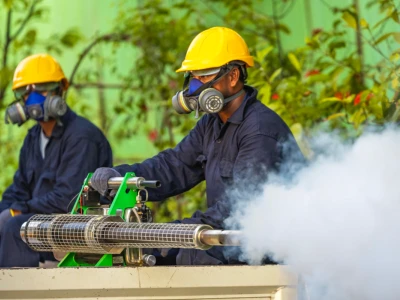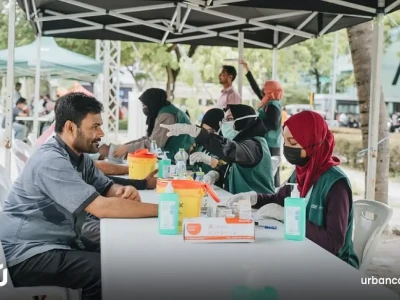
HPA urges caution against disease spread ahead of Eid holidays
HPA recommends wearing masks when going out if experiencing any flu or fever symptoms.
By
Ahmed Mizyal
With the Eid holidays just a few days away, various diseases such as dengue, chikungunya, diarrhoea, influenza and various other bouts of flu are on the rise.
The HPA has urged the public to take measures to reduce the chances of spreading infectious diseases and prevent them, as the holiday season is a time when people are busy travelling and engaging in various public activities.
Steps to manage and prevent respiratory diseases such as COVID-19 and influenza:
-
If cold symptoms and respiratory issues persists (longer than 3 weeks) after catching colds or flu, seek medical advice
-
If experiencing symptoms of cold or flu, wear a mask to cover mouth and nose when going out in public places, so that spread can be controlled
-
Washing hands thoroughly with soap or sanitizer frequently after outdoor activities or shopping
-
High risk people (people battling various chronic illnesses) should complete doses of influenza and COVID-19 vaccines
-
As few people as possible should accompany patients when visiting the doctor; children, the elderly and pregnant women should not visit patients in hospital. Do not go to the hospital unless absolutely necessary
Steps to prevent diarrhoea and vomiting:
-
Wash hands thoroughly with soap and water before eating and preparing food
-
Wash hands thoroughly with soap and water after using the toilet and changing diapers
-
Proper cooking and reheating of food, make sure meat products are thoroughly cooked. Wash raw vegetables and fruits thoroughly using hot water or baking soda, so that chemicals are also washed away
-
When preserving food at home, make sure the storage area is clean; wash and clean food preparation areas and utensils thoroughly
-
Keeping food covered so that insects or pests cannot reach it; use as much fresh food as possible and store food properly so that it does not spoil
-
Use bottled or chlorinated water or water supply water or boiled water for cooking and drinking
-
Use an appropriate sized closed dustbin for waste storage; dispose of garbage as soon as possible. Do not let garbage linger over 24 hours inside the house
-
Do not send children to school if they have diarrhoea or nausea
Ways to properly deal with diarrhoea and vomiting:
-
Use plenty of Oral Rehydration Solutions (ORS), coconut water, soup, watermelon, all natural and hydrating fluids and continue breastfeeding for infants
-
Seek medical attention immediately if experiencing additional symptoms with diarrhoea (abnormal thirst, dizziness, excessive fatigue, increased urination, frequent vomiting and blood in the urine, blood in the stool or abnormal/severe abdominal pain)
-
Do not go to work and rest at home for two days after symptoms of diarrhoea pass
-
Limit public outings
What you can do to protect yourself from dengue and chikungunya:
-
Wear loose clothes that provide proper body coverage and use mosquito repellent lotions and sprays to protect yourself from mosquitoes. Natural substitutes such as menthol, lavender and citronella extracts help too
-
Keep doors and windows closed at dawn and dusk (these are the times when mosquitoes are most abundant)
-
Do not throw empty bottles and cans into home yards and streets; water retention in such items facilitates the breeding of dengue-carrying mosquitoes
If infected with any of the virals and flus going around, the HPA recommends resting at home as the best home treatment. It will speed up the recovery while preventing the spread of the disease. A full 8 hour sleep cycle can do amazing healing and repair. Increasing fluid intake and electrolyte consumption can aid the healing process as well.
In addition, paracetamol can be used to relieve fever, body and joint pain. However, if fever persists for more than three days or if getting dehydrated and fatigued, it is important to seek medical advice and get tested.




